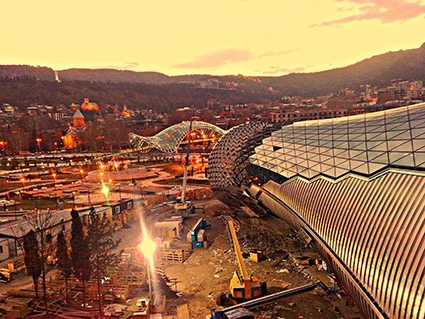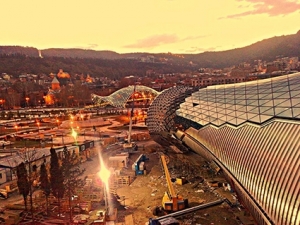Crimes against Architecture
In Tbilisi, a major crime has escaped the coliseum of the Georgian justice system. While obsessed with dragging offenses of the previous government before the court of retribution, the architectural rape of the city and pillage of its green spaces continues. City parks and open spaces are sold off to developers with not even the slightest public oversight, whilst the historic jewels of Tbilisi’s architecture rot due to the lack of funding. There is no credible plan to deal with their preservation while the Presidential Palace is not even used by the current government because it is too expensive to maintain as well as being impractical.
The current government magically went to sleep after its hard fought election and the building frenzy has slowed due to the lack of capital and lack of financial faith in Georgia.
The city’s planning, or lack of, is a masterstroke of unimaginativeness, building thoughtless structures and shunning the local historic references; steadily diminishing the unique feel of the city. Hulking grey slabs and glass follies are thrown up next to fake nostalgia of others, combining to look cheap, generic, and out-of-keeping with the traditional Tbilisi neighborhoods.
The city planners champion idiosyncrasies with no style. They promote dead-end design put forward by quick money developers who throw together quick buck boxes to live in, stifling any human creativity.
The decay continues with the help of the Historic Preservation Committee whose remit is to preserve historic areas such as Sololaki. Their task is to police and punish illegal construction in historic areas and meet once a month with the city’s architects to review, accept or reject plans for the designated historic zones of Tbilisi. There were times when the committee would not even bother to show up for the appointment. To remedy the problem they decided to meet once every three months.
Lifeless architecture is also bad for business and incredibly short sighted in what was a beautiful city with the potential to generate foreign revenue from architectural tourism. Lack of city funding has destroyed these areas that should be a major tourism boost for the city and return some form of civic pride to a population.
Cities don’t lose their souls; people do, and the architecture of our time only reflects it. Weak architecture comes from weak architectural philosophies. The aesthetics of spaces are connected the experiences people have in them.
Georgia’s turbulent recent history of revolution, failed war and a lack of economic hope for the general population, is shaping a cynical middle class and a disillusioned youth to create yet another lost generation who take refuge in old time religion, traveling back to a dream of time of Eden, invoking religious yearning disguised as wisdom.
Fuelled by a heady cocktail of faith and freshly minted democracy, Georgians love election time, not only because it gives them the right to scream, “throw the bums out”, but sidewalks, roads and the odd buildings get a temporary facelift. But how long can a city continue to put lipstick on a pig before the whole faзade melts in front of us?
There is no the gold standard, not even a bronze or wooden one, when it comes to new architecture in Tbilisi. It should not simply be a collection of individual buildings but a cohesive layer of character and beauty. These crimes are typical of architecture motivated by financial rather than artistic or humanistic values.
Will the city’s leaders look back proudly at their contribution of flashing light bridges, glass phalluses, sharp-angled concrete blocks with no sidewalk?
Meanwhile, every now and then a shadowy deal is struck and another irreversible blight on the city’s skyline appears. Citizens shrug their shoulders knowingly and apologise with the common phrase “What can we do.” Not a question, but a statement of helplessness in the face of yet another government with an opaque agenda of fiscal greed and deceit with no real plan to support the electorate that brought it to power.
You can become a crime stopper. If you see crimes against architecture in your area, speak out; write out, it is not too late. You have a voice. Learn how to use it.
A word from Peter Nasmyth, writer, publisher, co-founder of Prospero’s bookshop-cafe and member of the British Georgian Society: This opinion piece very starkly expresses feelings that many people hold in Tbilisi. I know dozens of Georgians and foreigners alike who would ascribe to this attitude. The theme of Tbilisi’s preservation as a historic city is an increasingly desperate one. With the proposed developments like Mirza Shape (and the semi completed Millenium hotel on Rustaveli) there seems almost no hope. There is a fear that City Hall has lost all sense of its own past; that Tbilisi’s unique character is being sacrificed for the sake of the worst kind of investment, both foreign and local and that the city may soon become an example to the world of how not to renovate historic districts. But I personally still feel there is hope; that planners and decision makers are capable of learning from other historic European cities. Not all restoration in Tbilisi is bad – indeed some is very good. One likes to point to this and other examples worldwide and hope they will be followed.
Michael Allen












